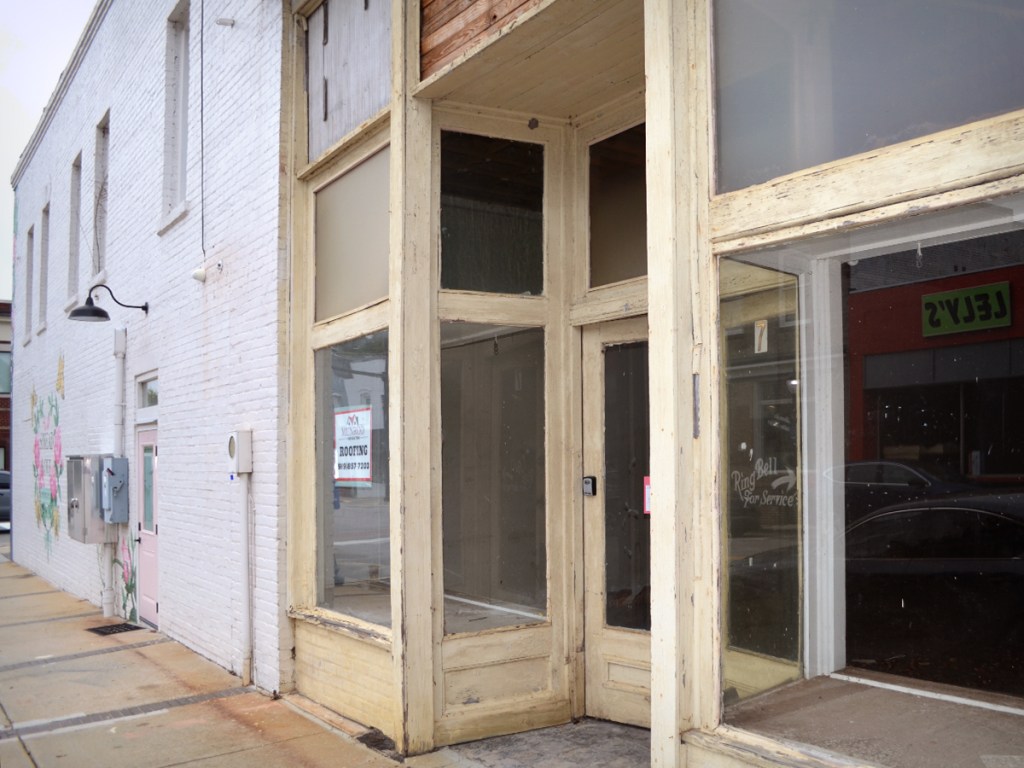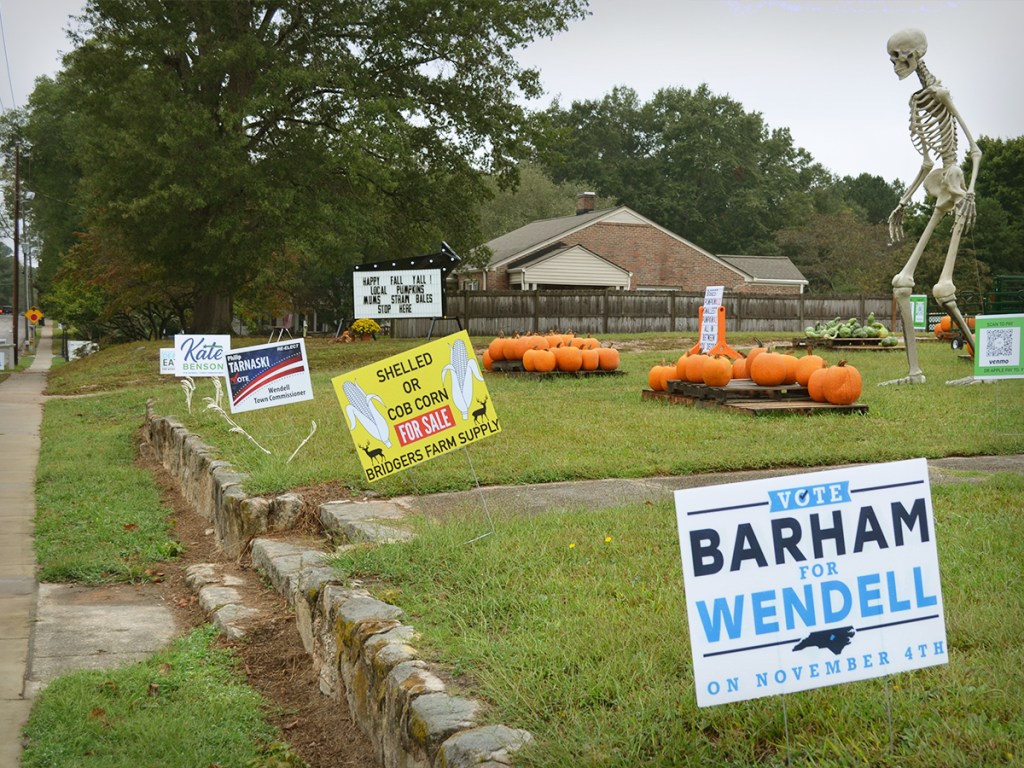Many Wendellians—including several of the eight candidates running for three seats on the town board of commissioners—tell a similar story about what attracted them to the small but growing eastern Wake County town.
“Once I saw the geographical area, I was like, ‘This is exactly where I want to start and raise a family,’” says BJ Barham, a first-time candidate and the frontman of American Aquarium. “We found a 1938 Dutch Colonial in the middle of downtown Wendell … and we moved into a really amazing neighborhood. To be able to be 10 miles from the epicenter of one of the fastest-growing cities in America and still feel so far removed from it just [by] driving 15 minutes east, it’s a beautiful best-of-both-worlds situation.”
Candidate Dustin Ingalls also moved to Wendell to put down roots.
“Four years ago, I was living in downtown [Raleigh] with roommates, renting, and I was 36,” Ingalls says. “And I started thinking, ‘What would it take to buy a house? Can I afford it?’”
In Raleigh, the answer was a resounding no. So he ventured further afield.
“I was like, ‘Oh, this is a cute little downtown. The vibe here is all local businesses. There’s no chain restaurants to be seen.’ This felt like a place I could be,” he remembers. “Also, the house was affordable—that’s the main part.”
Barham and Ingalls may both have been wooed by Wendell’s small-town charm, but from there, their paths to local candidacy diverge.
Barham, a Democrat, is running as part of what he calls a “unity ticket” with Republican former commissioner Philip Tarnaski and unaffiliated candidate Kate Benson. Their slate is generally skeptical of Wendell’s recent growth—the town’s population has almost doubled in the last five years to over 17,000, making it one of the fastest-growing municipalities in the nation—and believes the board of commissioners should be more selective in approving new development. His entry into local politics was as a neighborhood advocate, arguing against the development of eight three-story townhomes across the street from his historic home (he and his neighbors were unsuccessful and the property was rezoned earlier this year).
“We live in one of the fastest-growing towns in one of the fastest-growing counties in America. It would be naive to think that growth is not coming,” Barham says. “I would like to see the high-density townhomes and apartments not entering into established neighborhoods, not entering into our historic district. … We do need to address infrastructure, schools, medical facilities. We need to worry about revitalizing our downtown.”
Barham says the past decade has been marked by “growth for the sake of growth” in Wendell, with the board of commissioners “rubber stamping” developments that don’t benefit current residents.

Ingalls, the director of North Carolina political programs for the Environmental Defense Fund and a former political consultant, is more inclined to embrace the growth. He points out that new tax dollars can be reinvested into local businesses, infrastructure, and the economy, and that building more densely in the heart of Wendell helps to preserve forested area and farmland at the town’s edges.
“A lot of people think that historic preservation and growth are incompatible, that you pave over paradise when you grow,” Ingalls says. “But in some ways you need growth—need population and tax base growth—to maintain your history.”
“I moved here largely because I couldn’t afford to live in Raleigh, and fell in love with the town, and I want to be a part of shaping it for years to come,” he adds. “But sometimes I feel like people would have shut the door in my face if they could have.”
Barham and Ingalls aren’t the only candidates talking about Wendell’s growth—it’s the animating issue of this election, with implications for housing affordability, infrastructure, and the future of downtown. It’s not a question of whether Wendell will continue to grow, but how.
“Our role as a local government is to respond to and manage that growth in a way that is additive to the town, additive to our community,” says Deans Eatman, deputy secretary at the NC Department of Natural Resources, a first-term commissioner, and the only incumbent in the race (two other commissioners, Jason Joyner and Jon Lutz, are not seeking reelection). “A high-level growth philosophy that I have is, if you’re going to have growth, it should happen in places where it’s connected, and there are amenities like downtown business districts, wastewater systems, stormwater systems, transportation infrastructure.”
Since Eatman was elected in 2021, the board of commissioners has adopted a new comprehensive plan, created a downtown social district, funded a new community center and competitive pay adjustments for town staff, adopted a nondiscrimination ordinance, and begun requiring developers to have community meetings during the rezoning process.
Eatman pushes back against Barham’s “rubber stamping” characterization: “There are a ton of growth and development proposals that get brought to our staff and either never see the light of day, or look so unrecognizable by the time that they do,” Eatman says. He, along with Ingalls, is endorsed by the Wake County Democratic Party.
Like Barham, Benson and Tarnaski are campaigning for “responsible growth that honors our roots,” as Benson phrases it on her website. She tells INDY that Wendell is “not asking [developers] to do as much as we want them to” and has “made it way too easy to pop up a neighborhood, and then ask the DOT [Department of Transportation] to handle” the resulting traffic.
Tarnaski puts it more bluntly: “All we have here right now is high density,” he says. “There’s no room. Everything’s on top of each other. … [and] it hasn’t made the price go down.”
U.S. Census Bureau data confirms that permitting for new housing in Wendell has spiked in the last decade, from 19 units authorized in 2013 to 1,054 authorized in 2023, the most recent year for which data is available. But single-family development dominates the market: of the 4,566 units authorized in that 11-year span, 3,651 were single-family and 915 were multi-family.
Despite campaigning energetically as a unit, Barham, Benson, and Tarnaski have not reported any campaign donations to date. Barham says the fact that he and his running mates aren’t taking money from developers reflects their commitment to regular residents of Wendell.
“I think a lot of people are excited that I’m not a career politician,” he says. “I do not have any aspirations of being a senator … I’m a rock-and-roller who cares about my hometown.”

Of the remaining five candidates, Jorge Cordova and Christopher Critzer have not reported any donations, either. Eatman has raised about $5,000 as of the most recent reporting deadline, Ingalls has raised about $29,500, and Wes Jones has raised about $25,500.
Jones is an attorney for the NC General Assembly’s House Oversight & Government Operations committee, a “founding member” of High Point University’s law school, and a creative writer (the author bio for his self-published poetry book describes him as “ungentle when holding a flower,” “subtly managerial,” and “aware of his own existence.”) According to the NC State Board of Elections, he voted in Guilford County last year and has never voted in Wake County, suggesting a recent move. Despite this unorthodox path to local candidacy, Jones has secured an endorsement from the Wake GOP and raised the second-highest amount of any candidate.
He did not respond to INDY’s interview request.
Cordova seems to be a growth skeptic; his campaign website emphasizes avoiding gridlock, infrastructure strain, and “loss of charm.” He is endorsed by the Wake GOP and has been canvassing in Wendell with Turning Point Action, according to his Facebook.
Critzer owns an anesthesia business and a restaurant in neighboring Knightdale. On his campaign Facebook page, he focuses on traffic, public safety, and supporting Wendell’s small businesses. Critzer is suing the Town of Wendell, the Wendell Police Department, and a town police officer who, Critzer claims, “allowed a marching band to perform outside [Critzer’s] residence after midnight” and then, when Critzer investigated the noise “armed only with a golf club and concrete tool for protection,” falsely arrested Critzer on accusations of assault and resisting arrest. The case was moved to federal court this summer.
Critzer declined to comment for this story. Cordova did not respond to the INDY’s request for comment before publication, but we will update the story if he does.
Aside from the fraught issues of population growth and housing, many of the board of commissioners candidates INDY spoke to brought up the same topics: the need to attract more small businesses to downtown; to protect the open spaces around Wendell; and to make sure roads and other infrastructure keep up with growth. Eatman added that the board of commissioners’ day-to-day work is much less controversial than election season makes it seem.
“It’s easy to lose sight of this sometimes, but we all live here, we all love Wendell,” he says. “On November 5, I hope we’re all going to still live here, and we’re all going to still love Wendell.”
Early voting in Wake County began October 16 and runs through November 1. Election Day is November 4. You can find more information on where and how to vote here.
Chloe Courtney Bohl is a Report for America corps member. Follow her on Bluesky or reach her at [email protected]. Comment on this story at [email protected].
